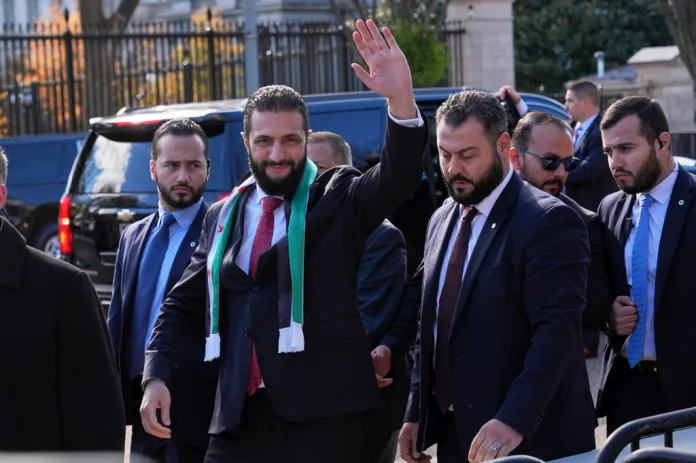President Donald Trump quietly welcomed interim Syrian President Ahmed al Sharaa to the White House on Wednesday, a historic moment as the two countries take another step toward ending decades of U.S. isolationism toward Syria.
Sharaa arrived at the White House shortly after 11:30 a.m. without the pomp and circumstance of the ceremonial honor guard that typically welcomes foreign leaders to the White House. He departed a little after 1:15 p.m., stopping to see Syrian supporters outside the executive compound.
However, Trump’s welcoming of Sharaa to the White House without the press is unsurprising, considering the State Department removed the former al Qaeda terrorist organization leader, who, until last year, had a $10 million bounty on his head, from the United States’s terrorist sanctions list only last week.
“This is a historic visit by any standard — historic because this is the first Syrian leader to come to the White House in 60 years and because it marks the end of the ‘war on terrorism’ as the sole guiding principle of U.S. approach to the Arab world,” Brookings Institution foreign policy fellow Asli Aydintasbas told the Washington Examiner.
Trump started recalibrating the U.S.-Syrian relationship in May after Sharaa and his rebel forces successfully toppled former Syrian President Bashar Assad‘s family regime from power in December 2024.
During his trip to the Middle East in the spring, Trump announced that he would begin dismantling U.S. sanctions against Syria before his first meeting with Sharaa in Saudi Arabia, marking the first time leaders from the U.S. and Syria sat down together in 25 years.
Sharaa is a “young, attractive guy. Tough guy. Strong past. Very strong past. Fighter,” Trump said at the time.
Trump then signed an executive order in June rescinding more U.S. sanctions against Syria, creating a pathway for U.S. reconstruction assistance and foreign direct investment to Syria after its decadelong civil war. The Caesar Syria Civilian Protection Act remains in place without congressional action, but Secretary of State Marco Rubio on Monday issued a six-month moratorium on its sanctions.
“When the president was in the Middle East, he made the historic decision to lift sanctions on Syria to give them a real chance at peace,” White House press secretary Karoline Leavitt said last week. “We’ve seen good progress on that front under their new leadership, and so he will be here at the White House on Monday.”
To that end, Sharaa is hoping to use his trip to the U.S. to sign an agreement regarding Syria’s entry into the Global Coalition to Defeat ISIS, gain more sanctions relief, and consent to possible new military cooperation with the U.S. amid reports that the U.S. could have a presence at an air base near Damascus for counter-Islamic State group operations. Syrian forces last weekend conducted raids in the capital and other provinces, killing a member of the Islamic State group in the process.
Trump and his administration are trying to bring Syria “into a rules-based framework to fight ISIS, limit Iranian and Russian influence, and open space for Western oversight in reconstruction,” according to Heritage Foundation Allison Center for National Security visiting fellow Amine Ghoulidi.
“For Washington, success also means lowering long-term tension with Israel and laying the groundwork for a stable, neighborly relationship rooted in pragmatism and shared regional interests,” Ghoulidi told the Washington Examiner.
Ghoulidi expected “strong signals of alignment rather than immediate breakthroughs” as the U.S. and Syria pursue “a pragmatic reset.” However, the scholar conceded that Trump, “who spearheaded the Abraham Accords, has a record of advancing historic peace initiatives and could use this opportunity to expand that legacy.”

Sharaa has described a security agreement with Israel as a “necessity,” indicating one could be signed soon.
“Syria’s formal entry into the anti-ISIS coalition will serve both sides: It amplifies U.S. influence and grants al Sharaa long-sought legitimacy,” Ghoulidi said. “Any movement on sanctions or reconstruction will likely hinge on measurable progress in counterterrorism, border security, and sustained disengagement from the influence of U.S. adversaries.”
However, Ghoulidi advised that “engaging a post-conflict Syria requires steady calibration” and that “success will depend on sequencing” from “linking normalization to continued reforms and regional coordination.”
There have already been problems regarding the merger of the new Syrian army and the Kurdish-led Syrian Democratic Forces, a U.S. demand that in March was agreed to in principle.
“With clear benchmarks and close consultation with partners and allies in the Middle East, this outreach can consolidate stability rather than risk it,” Ghoulidi said. “The priority for Washington is to manage engagement in a way that strengthens regional security and advances U.S. strategic interests over the long term.”
Aydintasbas similarly advised the U.S. against “reducing Syria to a security partner only” as part of its post-conflict engagement.
“It needs to make sure the new regime can provide the type of inclusive and representative governance model that a country like Syria needs,” she said. “It would need to complement military aid with governance aid.”
Sharaa is a former rebel commander and the leader of Hayat Tahrir al Sham, the Syrian arm of al Qaeda, before it broke away from the terrorist organization in 2016. He was detained by the U.S. in Iraq from 2006 to 2011 before becoming Syria’s de facto leader in 2024 and its interim president in 2025, with an election to be held in four to five years.
STATESMAN TRUMP HAS EYE ON DIPLOMATIC LEGACY, DESPITE ‘AMERICA FIRST’ CRITICS GETTING LOUDER
Trump’s meeting with Sharaa comes before the president’s next historic sit-down this month with Saudi Crown Prince Mohammed bin Salman at the White House. However, Trump is unlikely to convince the kingdom’s pseudo-leader to normalize its relations with Israel without a commitment first from Israeli Prime Minister Benjamin Netanyahu regarding Palestinian statehood.
Sharaa is expected to meet with other officials while in the U.S. after sitting down with Syrian American organizations and community representatives last weekend.

